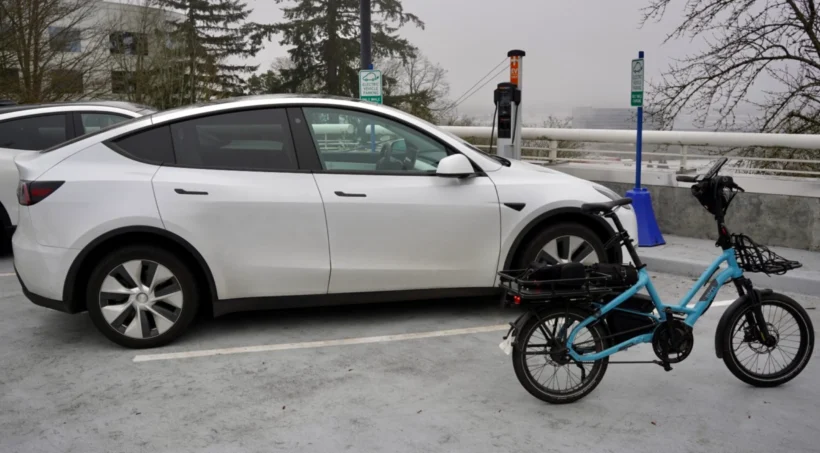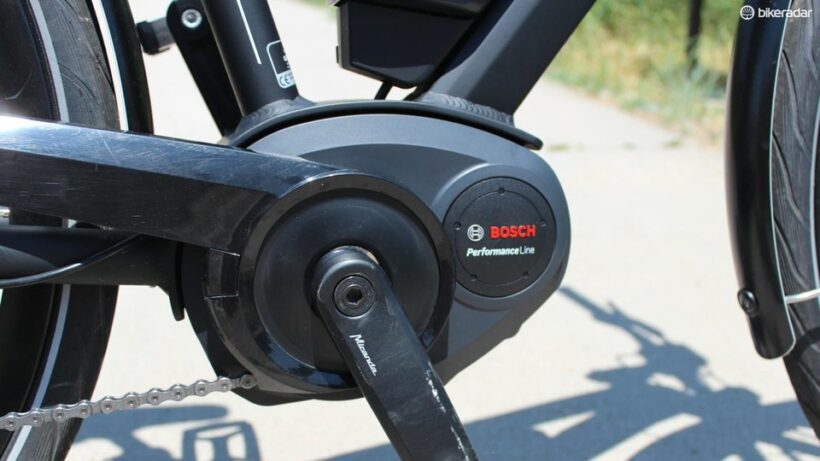The 21st century has ushered in a wave of innovation and environmental consciousness, leading to the widespread adoption of electric vehicles (EVs) as a cleaner and more sustainable mode of transportation.
Among the electrified options, two contenders have emerged as popular choices for personal transportation: electric bikes (e-bikes) and electric cars. Both offer compelling advantages, but they cater to different needs and lifestyles.
In this comprehensive comparison, we’ll explore the benefits, drawbacks, and considerations of electric bikes and electric cars so as to help you decide which option suits your needs.
Environmental Impact

Electric Bikes: E-bikes are inherently more eco-friendly than their four-wheeled counterparts. They produce zero carbon emissions, which helps in reducing air pollution as well as the greenhouse problem. Additionally, the energy required to charge an e-bike’s battery is significantly lower than what’s needed for an electric car.
Electric Cars: Electric cars also contribute toward a cleaner environment compared to traditional internal combustion engine (ICE) vehicles. They help reduce air pollution in urban areas, decrease dependence on fossil fuels, and contribute to a more sustainable transportation system. However, manufacturing and disposing of EV batteries can have environmental implications.
Cost
Electric Bikes: E-bikes are generally more affordable than electric cars, both in terms of upfront purchase cost and ongoing operational expenses. While the initial investment might be higher than that of a traditional bicycle, it’s still significantly lower than purchasing an electric car.
Electric Cars: Electric cars tend to be more expensive than their gasoline counterparts, primarily due to the cost of the battery and advanced electric drivetrain technology. However, they often benefit from government incentives and lower operating costs, especially when compared to traditional gas-powered cars.
Range

Electric Bikes: E-bikes have a limited range, typically ranging from 20 to 60 miles on a single charge, depending on factors such as the battery capacity, terrain, and level of pedal assistance. This range is suitable for short commutes and leisure rides.
Electric Cars: Electric cars generally offer a much longer range than e-bikes. Modern EVs can travel over 200 miles or more on a single charge, making them suitable for longer trips and daily commuting without worrying about recharging.
Charging Infrastructure
E-bikes can be charged using a standard electrical outlet, and the charging time is relatively short, usually a few hours. This makes it convenient to top up the battery at home, work, or any accessible outlet.
Electric Cars: Electric cars require more extensive charging infrastructure, such as dedicated charging stations. While home charging is an option for EV owners, longer trips may require planning to ensure you have access to charging stations along the route.
Health and Fitness
Electric Bikes: E-bikes provide pedal assistance, allowing riders to cover longer distances and tackle challenging terrain with less physical effort. While they still require pedaling, the assistance makes cycling more accessible, particularly for those with physical limitations or those who aren’t avid cyclists.

Electric Cars: Electric cars do not provide the same health and fitness benefits as e-bikes. They are convenient for commuting but lack the physical activity aspect that cycling offers.
Storage and Parking
Electric Bikes: E-bikes are compact and require minimal storage space. They can be easily parked in a bike rack or even indoors, making them a convenient option for urban dwellers with limited parking options.
Electric Cars: Electric cars, while smaller than many traditional vehicles, still require dedicated parking spaces or charging stations, which might be challenging in crowded urban environments.
Traffic and Urban Mobility
Electric Bikes: E-bikes can maneuver through traffic and narrow spaces more efficiently than cars. They are particularly useful for urban commuting, offering a quicker way to navigate congested streets. However, some e-bikes like the Engwe EP-2 Pro can also be used for off roading.
Electric Cars: Electric cars also benefit from reduced traffic congestion, and many cities are providing incentives for EVs, such as preferential parking and access to carpool lanes.
Fitness and Physical Activity
Electric Bikes: E-bikes provide a moderate level of physical activity, as riders still need to pedal, but the electric assistance makes cycling less strenuous. This can be beneficial for those who want to stay active but might face physical limitations.
Electric Cars: Electric cars do not offer any fitness benefits, as they rely solely on the electric motor for propulsion. So, that’s another win for e-bikes.
Maintenance
Electric Bikes: E-bikes generally require less maintenance than electric cars. There are fewer complex components, and the wear and tear on the drivetrain are reduced due to the assistance from the electric motor.
Electric Cars: Electric cars have fewer moving parts than traditional gasoline vehicles, but they still require maintenance and periodic servicing, especially related to the battery and electric drivetrain. Compared to e-bikes, electric cars are obviously way more costlier to maintain!
Community and Lifestyle
Electric Bikes: E-bikes promote a more active lifestyle and a closer connection with the local community. They’re ideal for short trips to local businesses, social gatherings, and leisurely rides… or even for beach and trail riding. E-bikes typically have limited speed, but you can speed unlock them to achieve cruising speeds.
Electric Cars: Electric cars offer convenience and can be suitable for longer trips, but they might not promote the same level of community engagement as e-bikes. On the upside, they look much cooler than bikes. But again, this is a matter of personal preference!
Final Words

The choice between an electric bike and an electric car ultimately depends on your specific needs, lifestyle, and preferences.
If you’re looking for an eco-friendly, cost-effective, and convenient mode of transportation for short commutes and urban mobility, an e-bike could be the perfect fit. On the other hand, if you require a longer range, more storage space, and the convenience of a car for various purposes, an electric car might be the better choice.
Both options contribute to a cleaner environment and represent significant steps toward a sustainable transportation future. With this, we end our comparison. We hope you found it informative!

